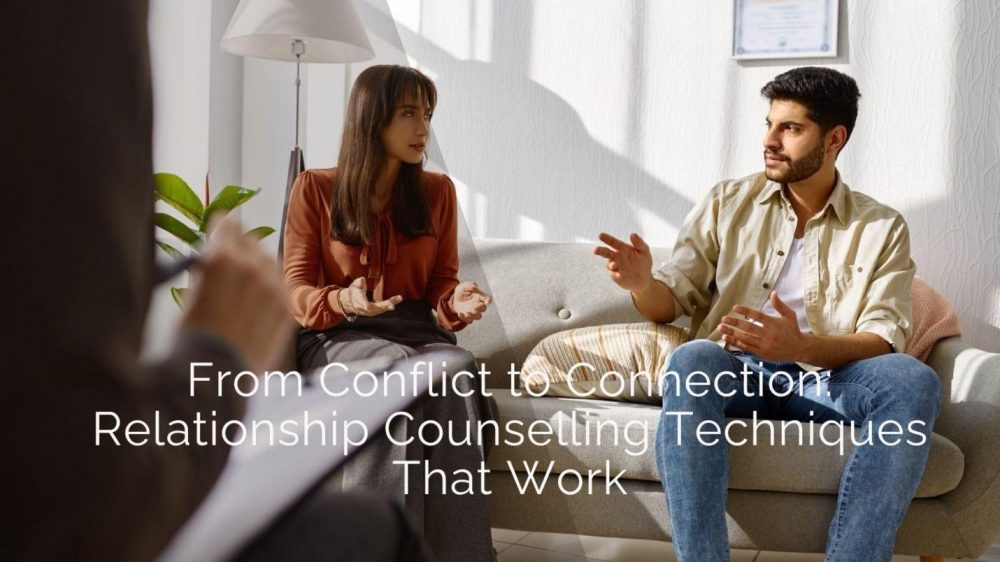Each and every relationship has a story behind it. One can laugh, feel warm, and happy in some chapters, and then some chapters are written with the ink of love, connection, misunderstandings, silence, and hurt, amongst others. Relationship conflict is inevitable, like the waves in the ocean; it rises, falls, and occasionally even crashes with a shattering impact on us. But what ought to become, when such waves, rather than dividing two individuals, should bring them closer together? Relationship counselling comes in here to work its magic: to change conflict into ladders of connection.
In modern society, which is highly dynamic; stress, expectations, and other external pressures on partners are very high, and conflict is therefore an unavoidable aspect. Connection is a choice, though, and counselling provides the means to make that choice, at the most challenging times. Let’s discuss the effective strategies employed in relationship counselling that can help couples transform tension into intimacy.
Why Conflict Isn’t the Enemy
It is the hope of couples that they can do away with conflict altogether, which makes them visit a counsellor or therapist for relationship counselling. However, the truth of the matter is as follows: the messenger is not the foe; it is the war. Similar to a fire alarm, conflict is an indicator that there is something wrong going on in the relationship. The issue is not that there are disagreements, but that disagreements are managed in this or that way which may or may not be helpful.
Mishandled, conflict is like termites at the root of intimacy. Managed properly, it turns into a stepping stone to greater perceptions and development. Counselling enables the partners to change their minds and view conflict as an opportunity to bond as opposed to a threat.
The Counsellor’s Role
Imagine two people at opposite sides of a river, each of them is sure that he or she is right. The misconception, suffering, and the lack of communication are all over the river between them. A counsellor is the bridge builder who offers the tools and strategies on which the partners can meet halfway.
It is not only the mediation of arguments. It involves providing couples with practical skills that they can take out of the therapy room and apply in their lives.
Techniques of Relationship Counselling That Work
1. Active Listening: Beyond Words Hearing
Among the most widespread in conflict are these statements: You never listen to me! You think you are always right!
Active listening can also educate the partners to listen and also to understand the feelings behind the words.
As an example, the message on the surface when one partner says, You never spend time with me, refers to time. Yet deep down, it might really say: “I feel I am not important to you.” And the trick is to understand the emotion behind the words through listening.
Partners would also practice paraphrasing, eye contact and empathy in counselling. This is a method that transforms discussions into conversations. Think of it as a game that is more of a transition between playing a tennis game (because the words are being hit against each other) and dancing (because they move to the beat).
2. Blame is Replaced with ‘I-Statements’
Words can wound or heal. You never pay attention to me is an accusatory statement and can bring about an instant defence in the other partner. Counselling promotes the substitution of this by “I feel lonely when we do not spend evenings together.”
I-statements redirect the blame game to sharing of feelings, and it is easier to involve the other partner in listening without developing a defensive reaction. It is as though reducing the level of conflict to allow the two to hear each other.
3. The Time-Out Technique
Couples in conflict need to have time-outs just as athletes do in the heat of the game before things get out of control.
During counselling, couples are taught to know their emotional red zone, which is the stage when they become angry, frustrated, or hurt to continue talking. Taking a break does not imply avoiding, but rather it will imply cooling down so that the conversation can go on with clarity.
This method helps arguments not become a boxing game of words, where the aim is not to win but rather to solve.
4. Going back to Shared Values and Dreams
Conflict tends to reduce to the levels of who is right and who is wrong. Counsellors make couples step back and recollect their values.
As an example, a couple quarrelling over money, may reunite when they are all found to want security of their family.
Activities such as the dreams within conflict (Gottman Method) technique reveal the hopes and needs that can be revealed under the apparent conflict.
5. Emotionally Focused Therapy (EFT): Recovery-Attachment Wounds.
The EFT is concerned with the emotional attachment of partners, particularly the fears and insecurities that breed conflict. Most conflicts are not based on tasks or times but rather on issues that are more analytical such as: “Do I trust them? Will you be there for me?”
Role-play, in which one of the partner exposes their vulnerability and the other involves practicing reassurance, is a common practice in counselling sessions. This converts cycles of criticism and rejection to cycles of connection and care.
6. Conflict as Cooperation: Problem-Solving.
Counsellors do not think of conflict as a battle that has to be won, but as a puzzle that should be solved together by couples. It is not how I get my way but how we go about assembling a way that is mutually agreeable.
Some of the methods include brainstorming solutions, balancing advantages and disadvantages and compromising. It is teamwork at its best and turning wrangles into the possibilities of partnership.
7. Repair Attempts: Little Gestures, Large Impact.
The tiniest effort to fix an argument such as a touch on the arm, a joke to break the mood or saying let’s take a breath can defuse the situation when the situation is very heated.
Counsellors condition couples to see and embrace such repair efforts rather than shove them off. These small acts of kindness over time form a network of safety that protects larger disputes.
The Advantages of the Counselling Techniques.
With the aid of these counselling strategies, couples tend to experience:
- Reduced hostility and blame
- Better compassion and knowledge.
- Greater emotional intimacy.
- More improved conflict resolution in future.
- A new feeling of collaboration and relatedness.
It is not about removing the disagreements but knowing how to go through them respectfully and attentively.
Connection to Conflict: A Journey and Not a Destination
Relationship counselling is not magic that eliminates conflict. Rather it is a guide which allows the couples to navigate through conflicts in a more sophisticated and determined way. It is about learning to connect to resolve and repair rather than increasing the distance that conflicts bring about.



